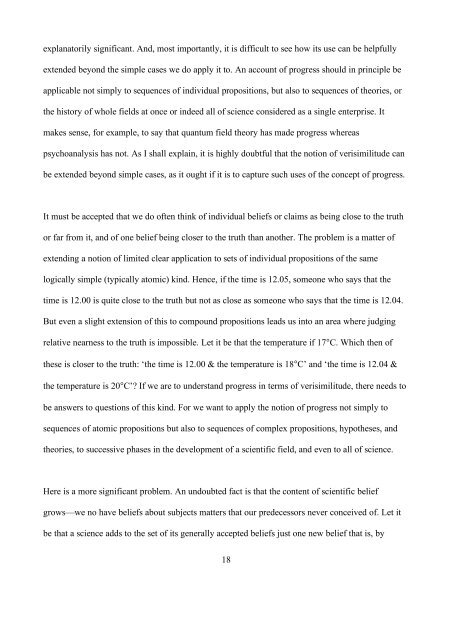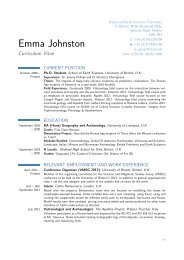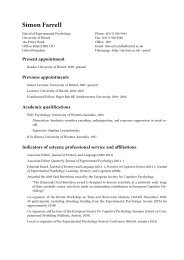What is Scientific Progress?
What is Scientific Progress?
What is Scientific Progress?
Create successful ePaper yourself
Turn your PDF publications into a flip-book with our unique Google optimized e-Paper software.
explanatorily significant. And, most importantly, it <strong>is</strong> difficult to see how its use can be helpfully<br />
extended beyond the simple cases we do apply it to. An account of progress should in principle be<br />
applicable not simply to sequences of individual propositions, but also to sequences of theories, or<br />
the h<strong>is</strong>tory of whole fields at once or indeed all of science considered as a single enterpr<strong>is</strong>e. It<br />
makes sense, for example, to say that quantum field theory has made progress whereas<br />
psychoanalys<strong>is</strong> has not. As I shall explain, it <strong>is</strong> highly doubtful that the notion of ver<strong>is</strong>imilitude can<br />
be extended beyond simple cases, as it ought if it <strong>is</strong> to capture such uses of the concept of progress.<br />
It must be accepted that we do often think of individual beliefs or claims as being close to the truth<br />
or far from it, and of one belief being closer to the truth than another. The problem <strong>is</strong> a matter of<br />
extending a notion of limited clear application to sets of individual propositions of the same<br />
logically simple (typically atomic) kind. Hence, if the time <strong>is</strong> 12.05, someone who says that the<br />
time <strong>is</strong> 12.00 <strong>is</strong> quite close to the truth but not as close as someone who says that the time <strong>is</strong> 12.04.<br />
But even a slight extension of th<strong>is</strong> to compound propositions leads us into an area where judging<br />
relative nearness to the truth <strong>is</strong> impossible. Let it be that the temperature if 17°C. Which then of<br />
these <strong>is</strong> closer to the truth: ‘the time <strong>is</strong> 12.00 & the temperature <strong>is</strong> 18°C’ and ‘the time <strong>is</strong> 12.04 &<br />
the temperature <strong>is</strong> 20°C’? If we are to understand progress in terms of ver<strong>is</strong>imilitude, there needs to<br />
be answers to questions of th<strong>is</strong> kind. For we want to apply the notion of progress not simply to<br />
sequences of atomic propositions but also to sequences of complex propositions, hypotheses, and<br />
theories, to successive phases in the development of a scientific field, and even to all of science.<br />
Here <strong>is</strong> a more significant problem. An undoubted fact <strong>is</strong> that the content of scientific belief<br />
grows—we no have beliefs about subjects matters that our predecessors never conceived of. Let it<br />
be that a science adds to the set of its generally accepted beliefs just one new belief that <strong>is</strong>, by<br />
18






